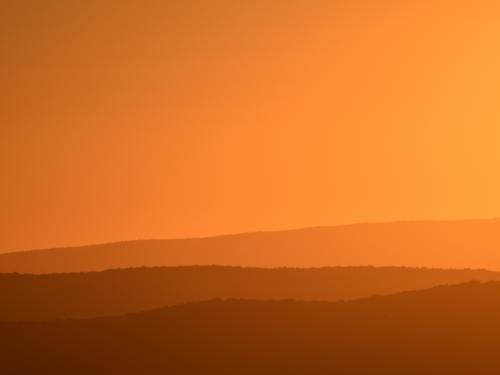
There is no need to change your posture. Kneel in the soil and put your hands on the dry ground. Crush a lump of dirt between your fingers and watch the cloud of fine dust spin away in the breeze. This is the smoke of your prayer. Notice how it does not rise to heaven but falls back down to earth, a dull coating on curled leaves.
Keep watch on the weather as a matter of devotion. Let your heart rise when the probability of rain on the forecasting app creeps above fifty percent. Your pulse should race when the clouds gather and show you their dark bellies, and the wind turns damp, and the temperature drops by a degree or two. When the rain clouds spit a few drops on your dry garden and slide away, leaving brutal blue skies in their wake, only then may you let your hopes fall again and despair creep in.
Make sacrifices for your shuddering faith. Expecting rain—believing in your heart that this mercy will come—do not water your garden transplants clustered in their pots by the fence. You placed them there in faith this spring. Once the contractors were done wreaking havoc in your backyard, you planned to replant the disturbed gardens with these old friends. But the workers keep coming, day after day, with their wrecking machines, and it has been months of waiting. Do not waver. Trust your beloved flock of peonies and thyme and all the rest to the mercy of the skies. The rain may yet come. Or else, as in these times of drought, the herbs and flowers you love will become burnt offerings.
Go with your sister and her husband and daughter to the edge of the Shenandoah River, now lying low in her banks, to pass the time while the rain does not come. The river’s sun-warm waters are the off-flow of other, distant storms and carry the wisdom of elders. Seat yourself on your blue and white tube and let the Shenandoah spin you slowly under herons and bank swallows. Submit yourself to the will of her current. Remember, you are a supplicant and ought not raise your voice to the river. Do not speak bluntly of your need or make demands of her. When the time comes, she will ask you why you’ve come. If you gave her enough time, she would ask you. But you have reached the place where the river bends in on itself, and it is time to get out again. Climb out of the water and carry your tubes back to the car along a narrow path. Follow your niece whose flip-flops are flinging dirt at her river-wet legs. Notice how it sticks to her like paint on a blank canvas.
Make a sacrifice of faith itself. You are well practiced in this. You have been doing it since you were twenty-two. You have almost (but not quite) accepted that your goodness has no bearing on the weather. Whatever good you might do, there will be no reward—rain or otherwise. Lightning isn’t drawn to evil. The August sunset shines for the just and the unjust alike, and even villains may weep over its beauty. The rain is not waiting for you to walk the path of righteousness. If you do good in this life, let it be from a nobler impulse than an attempt to conjure clouds.
When you are home from Virginia, go downstairs to the kitchen and fill the kettle to boil water for pasta. Watch the faucet’s bubble stream gush into the kettle, churning against the sides. Give thanks for the engineers who designed the city water system, the laborers who dug the trenches underneath the streets, the regulators who set the standards that prevent outbreaks of cholera. Turn off the faucet and carry the kettle to its dock.
Clean out the bone-dry birdbath. Use bleach because the wild birds are sick. Stop and wonder what the world is coming to. Wonder, too, what it has come from.
Pause before you go back inside to survey the damage the excavator has done to your garden. If the sorrow is too great, turn your eyes away from that bare swath of earth—cut between the mown-down raspberries and what used to be your terraced beds with the fieldstone walls you built by hand. Shield yourself from this pain. When you have heart enough, look up again. Examine the excavator’s squarish tracks in the dim dirt, the limbs ripped from the plum tree, the compacted soil where your herb bed was, the bindweed overgrowth. Walk into the destruction. Go back and forth from used-to-be to used-to-be until the clay dust turns your black boots gray. Do not shake this dirt off your shoes. It is yours. It belongs on your feet, even in this time of mourning.
Say the words “climate change” like the curse it is. Set this day as a benchmark in your mind. This will be the coolest, wettest summer of the next ten years, though now you call it drought and today you call it hardship. Call down vengeance on the heads of the men and women who knew that it would be like this (and worse) and shrugged away the warning. Revile the memory of those who enriched themselves on the road to a hell they would never inhabit. Curse their names. But do not mistake this scorching heat for justice. This boiling summer is no punishment. It is the end of a simple equation. Burn oil, warm the planet. Here we are. Amid your cursing, honor the hearts of those who meant well—the laborers who broke ground in the oil fields believing they were drilling for light and warmth. And were they wrong? Haven’t you been blessed by their labors? Hasn’t the world been transformed as if by miracle? Were they so foolish to think they were doing God’s work? But whether they worked in God’s name or yours or the devil’s—the consequences are the same.
Pray anyway. There will be no answer. There is no one who punishes. No one who saves. Do not worry about who these words are for (they are for you, dear). Pray anyway: “To the one who loved the very grass from the ground, who loved the oceans into their tides, the mountains to their majesties: Have mercy on us now—the panting sparrow, the crisping fern, and me. We suffer. We thirst. The very dust of the ground moans for relief. Send rain, Lord. Send rain.
